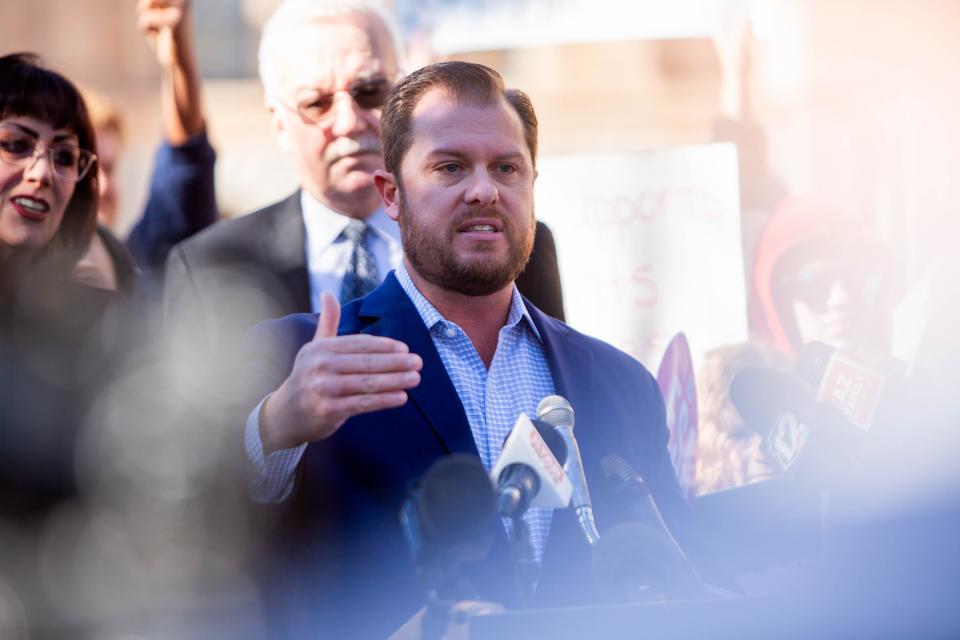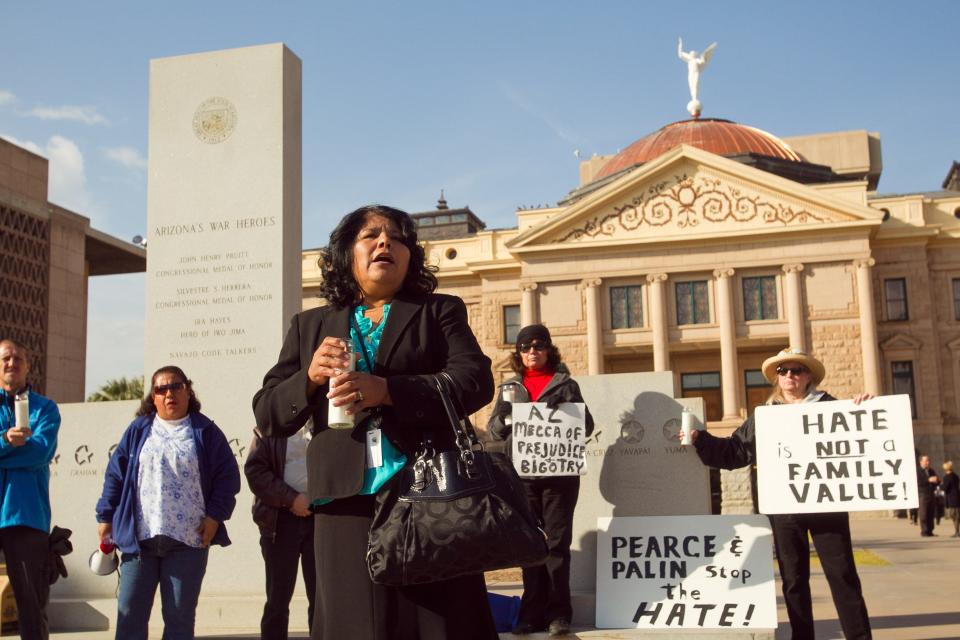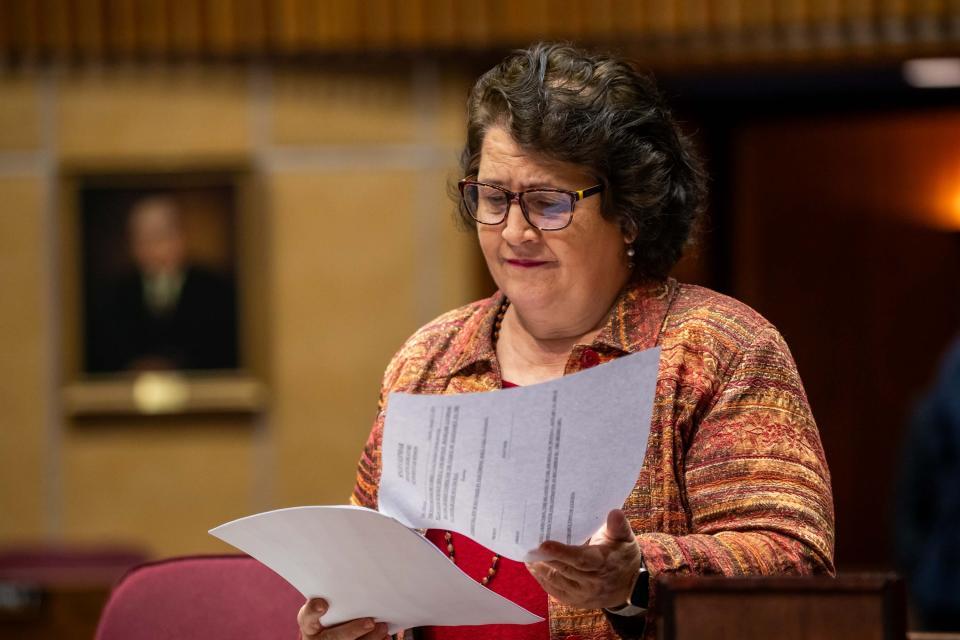GOP wants Arizona teachers using sexually explicit material charged with felony. But not private schools
- Oops!Something went wrong.Please try again later.
Republican lawmakers hope to add teeth to a 2022 law that bans public school teachers from referring students to or using sexually explicit material, making violations of the law a felony.
But, they don't want the law to apply to private schools, even though an increasing number of Arizona students receive state money to subsidize their tuition. Two Republican senators claim only public schools use sexually explicit materials.
The issue made for lively debate on the state Senate floor Feb. 15 after Senate Democratic Leader Mitzi Epstein offered an amendment to expand the scope of Senate Bill 1007, which would add the felony designation to the existing law.
"It sounds to me that voting against this amendment means you want to protect the owners of private schools," she said. "If a teacher is going to be subject to a felony under the vague terms spelled out in the underlying statute, then we need to apply this risk across the board to private schools as well."

The bill's sponsor, Sen. Jake Hoffman, insisted public schools considered a graphic illustration of "children having sex" appropriate for fourth-graders. He didn't reveal the source of the illustration.
"This might be one of the loonier amendments I've ever seen, given that apparently Sen. Epstein thinks that Christian schools are referring students to sexually explicit material," Hoffman said. "The idea that private Christian schools are showing these completely inappropriate and disgusting images to children is completely laughable."
Epstein noted that private schools included more than Christian schools and asked whether Hoffman would answer a question about the bill. He declined, but Republican Senate Majority Leader Sonny Borrelli said he would take the question. Epstein asked him why he didn't want to also "protect" children in private schools.
"Private schools are not showing these sexually explicit materials," Borelli responded. "It's all doing it in public schools."

Sen. Sally Gonzales, D-Tucson, spoke up to say she supported Epstein's amendment because of Republicans' 2022 expansion of the Empowerment Scholarship Account voucher program.
"Now that private schools are getting ESA funds that are public funds, then it should pertain to any school that receives public funding," Gonzales said.
Republicans ultimately rejected the amendment and passed the felony bill on party lines. It will now move to the state House for consideration.
Impact of existing law disputed
Democratic Gov. Katie Hobbs is unlikely to sign the bill. But the 2022 law has already had a chilling effect on public schools, according to Epstein and others.
The law, sponsored by Hoffman and signed by former Republican Gov. Doug Ducey, says public school teachers "may not refer students to or use any sexually explicit material in any manner." It defines the banned material as that which illustrates or describes sex acts, genitalia in a "state of arousal" or sexual conduct of almost any kind.
In an interview after the floor debate, Epstein told The Arizona Republic she believes Republicans want to "punish" public schools.
"By making wild accusations about public schools as evil, while making equally wild statements about Christian schools as perfect angels, Republican senators are fomenting rancor without evidence to support their claims," Epstein said. "Their goal is to sow fear around public schools, unwarranted fear."

She worries the law's "vagueness" means it could include classics like "Romeo and Juliet" or "The Odyssey," though the bill exempts sexually explicit material with "serious educational value for minors or possesses serious literary, artistic, political or scientific value." Parents can also give consent for their children to view any such materials.
The allegation of sexually explicit books or other media in public schools is part of a nationwide conservative movement that has spurred concerns centering on "book bans" and targeting of the LGBTQ+ community.
After Ducey signed the law, the American Civil Liberties Union of Arizona complained to the Glendale Union High School District about the alleged removal of books including Maia Kobabe’s graphic memoir “Gender Queer” from the district's schools. The American Library Association called the book, which includes illustrations of sex acts, the "most challenged" by critics in 2021 and 2022.
Hoffman said he would provide The Republic with some examples of sexually explicit materials found in Arizona public schools but never followed up.
After the 2022 law went into effect, ACLU attorney K.M. Bell asked the Glendale district that October to reverse its decision and to "cease removing books from the shelves that have LGBTQ themes." Bell also noted that Hoffman's law only targets materials teachers refer to students or "used in a curriculum."
"The language does not extend to a book that is merely accessible," Bell told the district, which didn't respond to questions about the policy last week.
A parent of two young students in Paradise Valley Unified School District said when her oldest child began fifth grade in 2022, her teacher sent home a list of books in the classroom because of the law.
"I had to look through and circle any books that I didn’t want my child to have access to," said Janine Gelsinger, who lives in the Phoenix portion of the district. "I signed it and wrote a little note to the teacher saying 'we trust you.'"
The teacher told her it took hours to make the list and that other teachers "just took all of the books out of the classrooms, which clearly is a very dismal picture," she said.
Asked about Gelsinger's claim, Paradise Valley district Superintendent Troy Bales denied teachers had to list books in their classrooms or take books off shelves. He said the law had "minimal impact" because the district already had practices in place that sought permission "when using sensitive titles."
"While this law did not make drastic changes in our district, it did offer us the opportunity to review and refine existing practices," he said. Bales did not answer a follow-up question about what changed.
Tom Horne is the Republican state superintendent of public instruction and a staunch critic of liberal school policies. He said no district or charter schools have contacted the Arizona Department of Education about the 2022 law or Senate Bill 1007.
"Schools must be focused on teaching academics, and when they do, there should be no concern about children being exposed to explicit materials," Horne said.
Reach the reporter at rstern@arizonarepublic.com or 480-276-3237. Follow him on X @raystern.
This article originally appeared on Arizona Republic: GOP shields private schools from sexually explicit material ban

